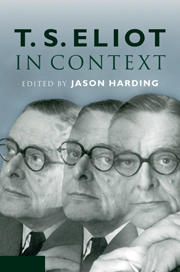Book contents
- Frontmatter
- Contents
- List of illustrations
- List of contributors
- Acknowledgements
- List of abbreviations
- Introduction
- PART ONE LIFE
- PART TWO FORMS
- PART THREE LITERARY CROSS-CURRENTS
- 16 Allusion: the case of Shakespeare
- 17 Classics
- 18 Dante
- 19 Seventeenth-century literature
- 20 Romantic and Victorian poetry
- 21 French poetry
- 22 Georgian poetry
- 23 Bloomsbury
- 24 Ezra Pound
- 25 The avant-garde
- PART FOUR POLITICS, SOCIETY AND CULTURE
- PART FIVE RECEPTION
- Further reading
- Index
21 - French poetry
Published online by Cambridge University Press: 05 August 2012
- Frontmatter
- Contents
- List of illustrations
- List of contributors
- Acknowledgements
- List of abbreviations
- Introduction
- PART ONE LIFE
- PART TWO FORMS
- PART THREE LITERARY CROSS-CURRENTS
- 16 Allusion: the case of Shakespeare
- 17 Classics
- 18 Dante
- 19 Seventeenth-century literature
- 20 Romantic and Victorian poetry
- 21 French poetry
- 22 Georgian poetry
- 23 Bloomsbury
- 24 Ezra Pound
- 25 The avant-garde
- PART FOUR POLITICS, SOCIETY AND CULTURE
- PART FIVE RECEPTION
- Further reading
- Index
Summary
Among the many tributes that Eliot paid to the Baudelairean tradition in French poetry throughout his career, there is none more eloquent than the one he gave in 1933, in his third and final Turnbull Lecture. Speaking in particular of Jules Laforgue and Tristan Corbière, he extends his acknowledgements to other poets:
I know that when I first came across these French poets, some twenty-three years ago, it was a personal enlightenment such as I can hardly communicate. I felt for the first time in contact with a tradition, for the first time, that I had, so to speak, some backing by the dead, and at the same time that I had something to say that might be new and relevant. I doubt whether, without the men I have mentioned – Baudelaire, Corbière, Verlaine, Laforgue, Mallarmé, Rimbaud – I should have been able to write poetry at all.
(VMP, 287)Shortly afterwards he declares roundly: ‘The ultimate purpose, the ultimate value, of the poet's work is religious’ (VMP, 288). It is no accident that this declaration should follow so close upon the naming of his different French masters. True, the wider context is philosophical and/or metaphysical poetry, and the overarching figure is Dante, but it is in reference to the French (and to something he often referred to as the ‘French mind’) that Eliot so often, implicitly or explicitly, came to define his own choices on moral and aesthetic matters.
- Type
- Chapter
- Information
- T. S. Eliot in Context , pp. 211 - 220Publisher: Cambridge University PressPrint publication year: 2011
- 2
- Cited by

